Since 2020, Takataka Plastics has transformed Uganda’s discarded bottles and packaging into tiles, face shields, flower pots, chairs, coasters and phone holders. The startup, based in Gulu, Uganda, designs and manufactures much of its plastic recycling equipment locally. The arrangement creates skilled jobs and a local talent pool for maintenance and repair. Since its launch, the venture has expanded to hire 40 full-time staff and more than 300 part-time collectors. Now Takataka Plastics is the only company in East Africa that locally recycles polyethylene terephthalate (PET) plastic bottles at scale.
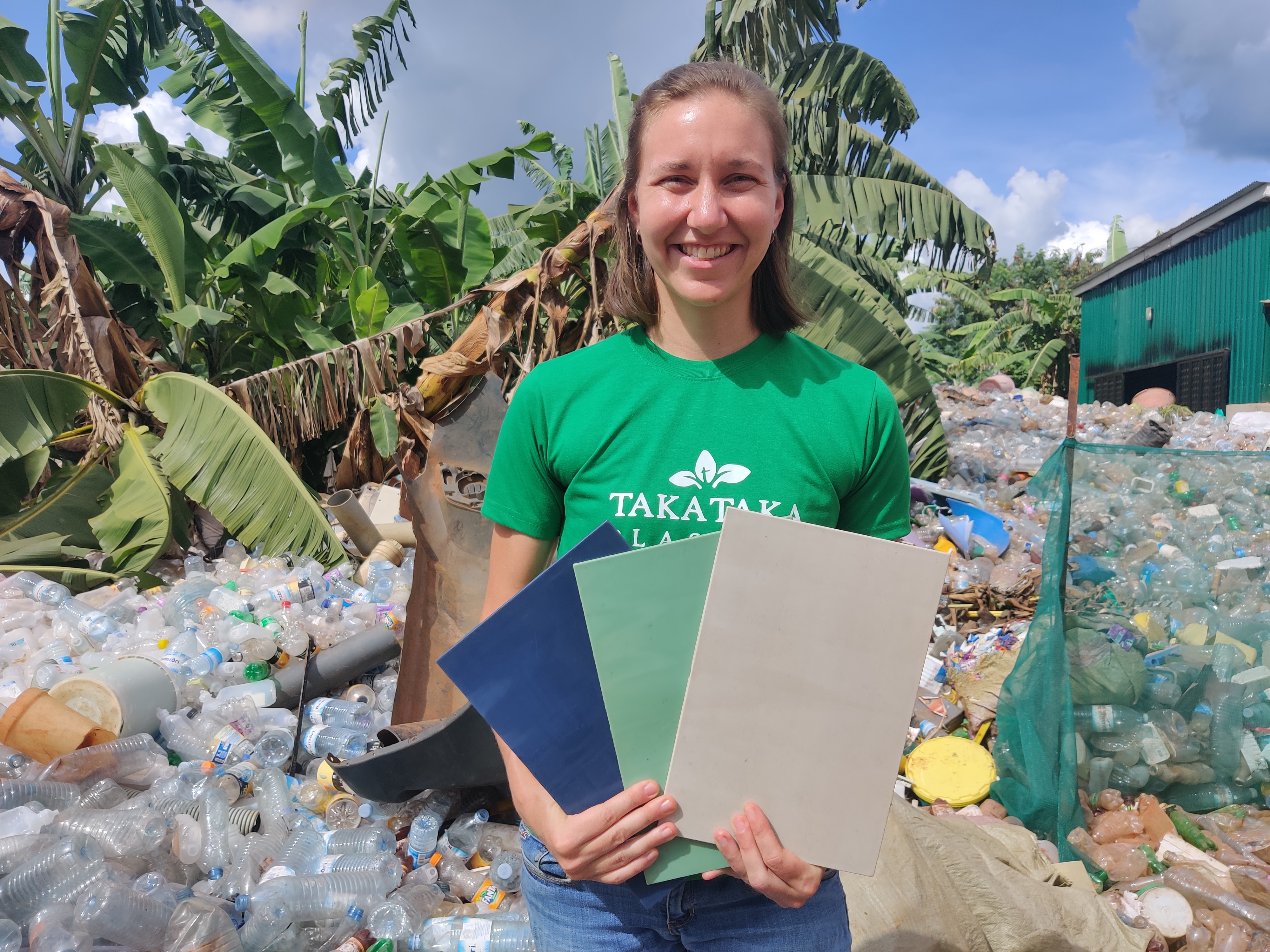
Paige Balcom shows tiles made from plastic bottles while standing in front of a pile of plastic bottles at the Takataka recycling facility in Gulu, Uganda. Photo courtesy of Paige Balcom
Takataka’s founders Paige Balcom and Peter Okwoko launched the venture as a solution to the mountains of plastic waste accumulating in Gulu. Although Gulu is Uganda’s second largest city, it had no plastic recycling facility before Takataka arrived. Residents burned their plastic or tossed it and lived with it as a transient element of the cityscape. Takataka introduced a circular economy for plastic, building the technology and providing a financial incentive to gather plastic waste and convert it into something useful.
Social startup founders can look to Takataka as a case study in establishing an essential service and products in an underserved community. Notably, Takataka is built around unique technological innovation, capacity building and a commitment to keeping the entire operation close to home.
Dr. Balcom was a mechanical engineering post-graduate student at the University of California, Berkeley, when she partnered with Mr. Okwoko, an IT lecturer at Gulu University. The team and their PET plastic recycling machines came to our attention as finalists in the US division of the American Society of Mechanical Engineers Innovation Showcase (ASME ISHOW) in 2022.
Dr. Balcom shares lessons learned while building Takataka Plastics from the ground up in Gulu, Uganda.
Think circular & make sustainability the priority from the start
To keep all the value of the waste local, we decided to do the whole process and make new products from the plastic waste. Many recyclers simply sell the plastics to larger companies and even export the plastic as raw materials, but the profit margins are very low and prices fluctuate a lot depending on international markets. The waste pickers in the informal sector who do the most dangerous and hardest work are paid very small money while the majority of the value of the waste is captured by the companies making the final products.
We flipped that around and built a local circular economy where waste is collected, processed, transformed into new products, and sold all within the community to keep all the value of the waste, all the jobs, and quality products to benefit the people where the waste was generated.
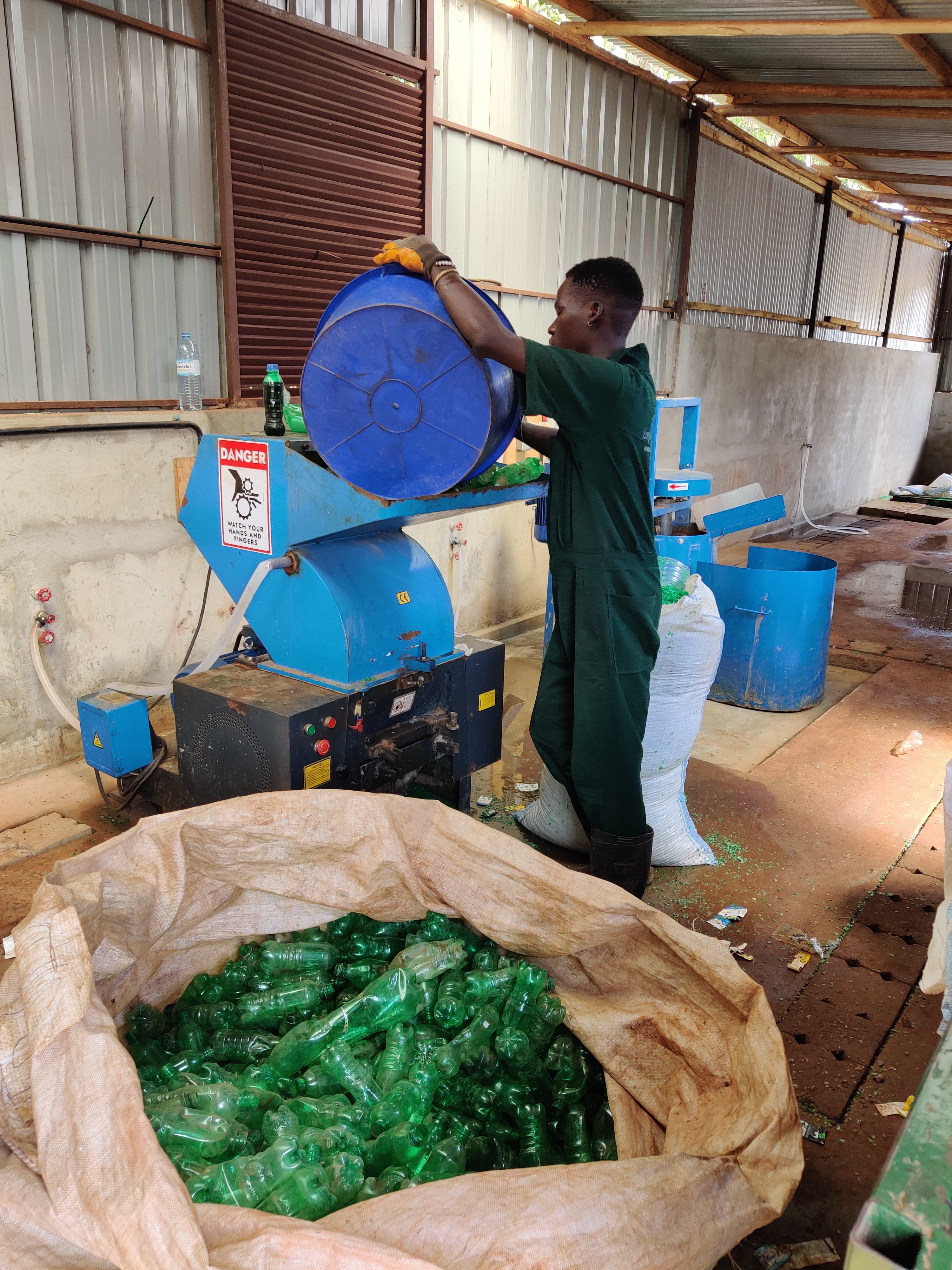
Bosco, who prefers not give his full name, fills a crasher that Takataka bought commercially then modified to suit their work. The crasher cuts plastic into flakes. A custom plastic washing machine is in the background, one of Takataka’s in-house innovations. Photo courtesy of Paige Balcom
Research, then pick a strategy to focus on
While there are general similarities in the plastic waste problem across countries, each region can have differences in the types and amounts of waste and existing recycling technology that will require tailored solutions. So first assess, what types of plastic waste are most available? How much of each type? What is the cost/kg of each type of plastic in your area? What products can be made from these types of plastic? What kind of demand is there for these products? Are there any companies already recycling plastic? How would your solution be different?
For us, our research revealed that PET water and soda bottles were the most common type of plastic waste in Uganda, but they could not be fully recycled in the country. The chemical properties of PET make it difficult to process at a small/medium scale, but because it was the biggest problem, we decided to focus on developing a solution for PET waste.
Find your niche by setting criteria for the ideal product
From our research, I realized we wanted a product that could:
- Be made from the type of plastic waste available (PET).
- Address the magnitude of the plastic waste problem.
- Have enough demand to sell enough products at a price that would allow the organization to be profitable.
We decided to focus on construction materials because they need a lot of material and there’s a significant demand for construction materials as East Africa is developing quickly. Uganda is projected to have an 8 million unit housing shortage by 2030. With construction materials, we can recycle all the plastic waste we can collect, and there’s enough demand to sell all the products we can make.
Determining an appropriate scale is difficult
Most cities in developing countries do not keep records on the amount and types of waste generated. Even many research reports often don’t contain enough detail to breakdown waste into specific types.
And of the waste generated in an area, how much can be collected? Most cities in developing countries do not have waste management infrastructure. There’s no separation at source. So it’s difficult to size machines and plan a business model that can be profitable and self-sustainable.
To attempt to estimate the amount of plastic bottles in Gulu, we went to the soda depots and asked how many sodas and waters they sold in a month. Although not all of these bottles would be able to be collected/captured, it at least gave us an idea of an upper limit of how much PET was passing through Gulu. We also estimated with another method using a waste generation multiplier based on population.
Gain support from the local government
Waste management is closely linked to public services. Since most governments in developing nations don’t have the funds for proper collection and handling of waste, there’s a need and opportunity for private companies to fill the gap. But they still need support from public officials for permissions and access, community mobilization and education, creation and enforcement of by-laws, and support in the public image.
Changing minds takes time and creative outreach
In countries where waste management infrastructure does not exist, you not only have to build the collection and processing infrastructure, but you also have to educate the community and secure their collaboration in managing their waste. In Uganda, 74 percent of uncollected waste is burned in open fires (“Open Burning of Waste: A Global Health Disaster,” R20 Regions of Climate Action, Geneva, 2019). Most people don’t realize that burning plastic is bad for their health and the environment (burning 1 kg of PET releases 2.2 kg of CO2 as well as carcinogens and other toxins.) Many schools still teach students that burning is the most responsible method of waste management.
When we first started Takataka Plastics, people thought we were crazy to be picking up rubbish off the streets—that’s seen as very dirty, last resort work. But after a couple of years of investing in outreach, people’s mindsets in Gulu have really changed. We’ve gone to schools, conducted community cleanups, shared on radio and TV, hosted countless tours of our facility, trained university interns, collaborated with popular local artists and comedians to produce music and comedy videos, and partnered with social media influencers. When people understand the dangers of burning and dumping and then see the products we make from rubbish, they’re amazed. They can’t believe such beautiful, high-quality products are made from waste and even more so that they’re made locally in Gulu. It fills them with pride and they’re willing to help play their part in keeping their city clean.
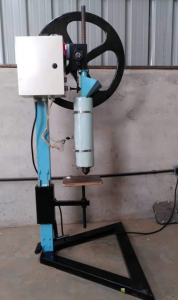
Takataka’s small-scale injection molding machine safely melts plastic flakes and injects the plastic into molds to make different products. This device was a finalist in ISHOW USA 2022. Photo courtesy of Paige Balcom
Be creative and flexible
With plastics, you can make so many different products. With different molds and a few finishing tools, the possibilities are nearly endless. So be creative. What needs do people have? What do they want to buy that you can make cheaper or higher quality? Put the power of design into the community’s grasp.
For example, during the COVID-19 pandemic, we saw a huge need for PPE. We pivoted to producing face shields and distributed over 20,000 across Uganda. Recently, we’ve turned recycled plastic sheets into chairs, stools, laptop stands, and phone holders. We’re also working on a prototype of a braille slate because the imported ones are too expensive for many people with disability.
Good marketing is key
Since Ugandans are not used to recycled plastic products, convincing people to buy can be difficult. Good marketing is important and getting influential early adopters helps. Ugandans tend not to care so much about the environmental aspect. Their most important factors are price, quality, and aesthetics. Many also value that our products are made locally by people they know. But our products being made from recycled plastic, saving the environment, creating jobs for vulnerable youth, and being innovative are less important to many customers.
Additionally, because there are no standards in Uganda for recycled plastic products, it’s a long process for us to work with the Uganda National Bureau of Standards (UNBS) to get our products approved. When customers don’t see a certified UNBS stamp on a product, it’s more difficult to convince them to buy. We’re working with UNBS, but in the meantime, we publicize the results of our own tests and invite people to try our products in display settings.
Creating jobs is one of the most impactful forms of development
Jobs can have more long-term impacts than training and skilling programs. In Uganda, it’s difficult to find work or start your own business even after finishing a training program. Many graduates from all levels of programs (from bachelor’s degrees to vocational certificates) cannot find work in their area of training. Uganda’s labor underutilization rate is 50 percent for females and 35 percent for males (Uganda Bureau of Statistics). Creating jobs in this context has profound effects.
- Earning a salary gives people dignity and allows them to provide for themselves and their families.
- A job is key to recovering from trauma and addiction.
- Having a place to report to every morning, where someone has responsibilities and a supportive workplace, provides purpose and something positive to focus on.
It’s challenging, but worth it
Launching a plastic recycling start-up is challenging and hard work, but it’s so worth it. Deliberating over big decisions, worrying about funding to pay your staff, and frustrations over partners and operations can keep you up at night and hijack your weekends and evenings. But it’s fulfilling, rewarding, and impactful work. Hanging out with our staff and seeing their lives transformed always brings a smile to my face and reminds me why we started Takataka Plastics.
About the Author
Paige Balcom is Co-Founder and Chief Technology Officer at Takataka Plastics in Gulu Uganda. She holds a PhD in Mechanical Engineering from the University of California, Berkeley, where she focused on Energy Science and Technology & Development Engineering. Paige pitched on Shark Tank and has received several fellowships and awards including those from the National Science Foundation, UC Berkeley, Fulbright Program, USAID, the Institute of International Education, and the Lemelson-MIT Student Prize.
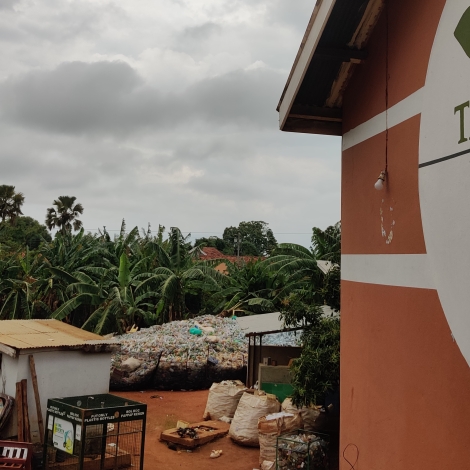
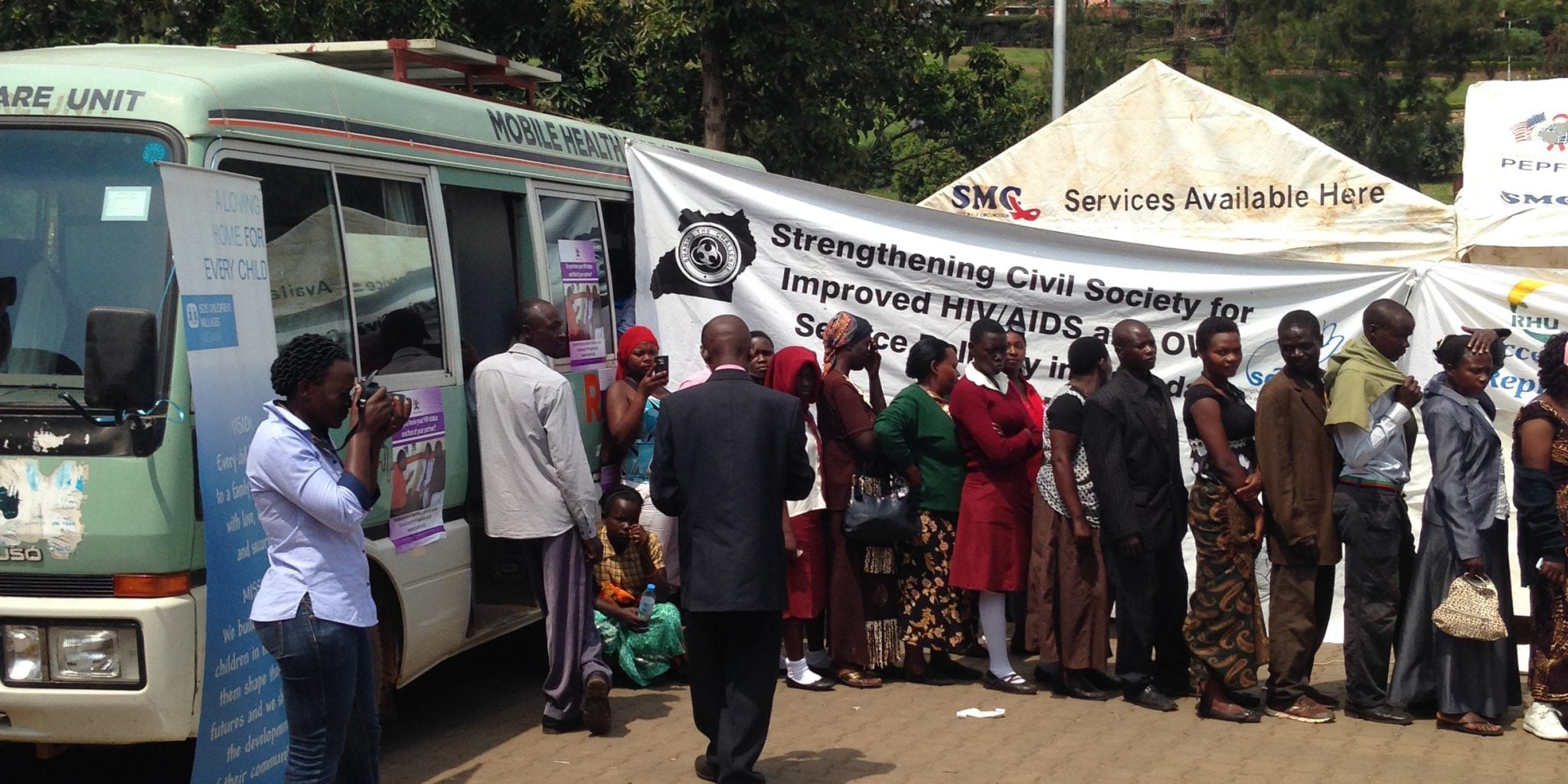
Great innovation by Takataka introduced a circular economy for plastic, by gather plastic waste and convert it into something useful. A good idea of converting plastics waste to valuable resources